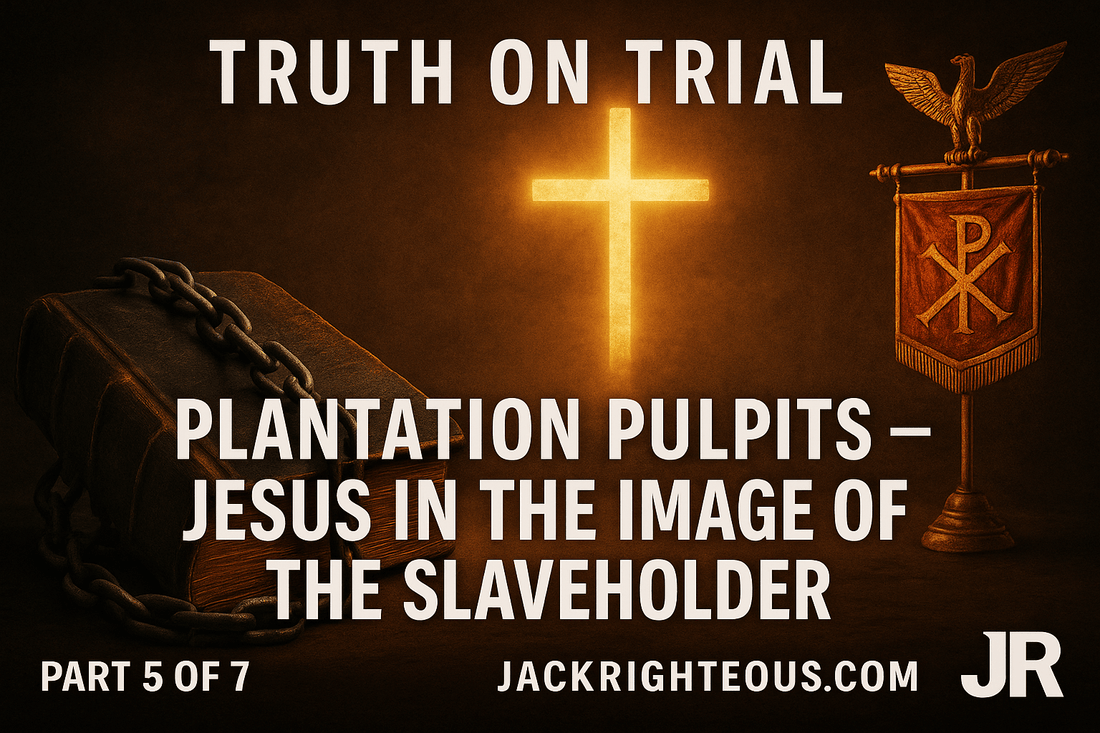
Plantation Pulpits: Slaveholder’s Jesus and Empire Faith
Gary Whittaker
Truth on Trial: Plantation Pulpits — Jesus in the Image of the Slaveholder
Part 5 of 7 in the “Truth on Trial” Series from JackRighteous.com
When the Cross Was Bound to the Whip
There was a time in American history when enslaved people were forced to sit at the back of the church—if they were allowed in at all. But what they heard from the pulpit was not the Jesus of the Gospels. It was a whitewashed Jesus, crafted in the image of the slaveholder.
- Demanded obedience to “masters”
- Justified racial hierarchy as divine order
- Preached submission, not liberation
This version of Jesus wasn’t accidental. It was strategic. It was weaponized religion—a gospel engineered to protect profit, power, and white supremacy.
The Theology of Control
Christian slaveholders didn’t just own people—they controlled their access to Scripture.
- The “Slave Bible,” published in 1807, removed over 90% of the Old Testament and half the New
- Passages about freedom or deliverance were eliminated
- What remained were verses like Ephesians 6:5 and Colossians 3:22: “Slaves, obey your masters”
“The Bible was used to keep us from revolting.”
— Frederick Douglass
How Pulpits Became Plantations
Throughout the antebellum South, sermons were delivered that:
- Claimed Africans were descendants of Ham—cursed by God to serve
- Declared slavery divinely ordained
- Framed rebellion as sin, and compliance as salvation
This was not Christianity. This was doctrinal grooming—a reengineered theology to preserve racial dominance.
And even after slavery was abolished, the architecture remained: segregated churches, theology schools built on white supremacy, and the rise of Christian nationalism.
Echoes of the Plantation in Project 2025
- Restores patriarchal, authoritarian Scripture interpretations
- Normalizes hierarchies of race, gender, and class
- Frames resistance as rebellion against God
- Targets federal protections for marginalized groups
Christianity Before Empire: The Women and the Way
The earliest Christians—those who followed “the Way”—were:
- Mostly poor, enslaved, or working-class
- Often worshipping in house churches led by women
- Centered on care for widows, orphans, and the oppressed
Women like Phoebe, Priscilla, Lydia, and Junia were foundational to the spread of Christianity. Junia was even called “outstanding among the apostles.”
The Roman Hijack
In 312 AD, Emperor Constantine claimed he had a vision: a cross in the sky with the words “In this sign, conquer.”
- Christianity became a tool of Roman governance
- The church mirrored imperial hierarchy
- Women were stripped from leadership
- Dissenting sects were crushed
The faith of martyrs was replaced by the faith of monarchs. Christianity was baptized in blood—this time, as conqueror, not crucified.
Project 2025’s Empire Theology
- Centralized authority over community
- Obedience over transformation
- Purity politics over prophetic justice
Its goal is not freedom—but order. Not grace—but hierarchy. Not truth—but tradition, sanitized and enforced.
The Echo in Today’s Church
- A Jesus who stays silent on injustice
- A gospel of obedience, not liberation
- “Biblical values” that uphold empire
Project 2025 is not inventing this theology. It’s reviving it.
Reclaiming the Real Christ
- Defied empire
- Centered the marginalized
- Condemned hypocrites
- Flipped tables—not just hearts
“When empire needs a god, it always chooses one that looks like itself.”
Where Do We Go from Here?
In Part 6, we examine how American exceptionalism and whitewashed history continue to overwrite truth and present nationalism as righteousness.
Keep the Record Alive:
- Share this with someone who thinks Christianity and conquest were never linked
- Subscribe to The Righteous Beat for new chapters
- Comment: What version of Jesus were you raised with—and how has that changed?
Continue Reading the “Truth on Trial” Series:
- Part 4: Pacts and Power — The Pope, the Pact, and the Price of Silence
- Part 6: Selective Memory — Who Got Written Out and Why It Still Matters

